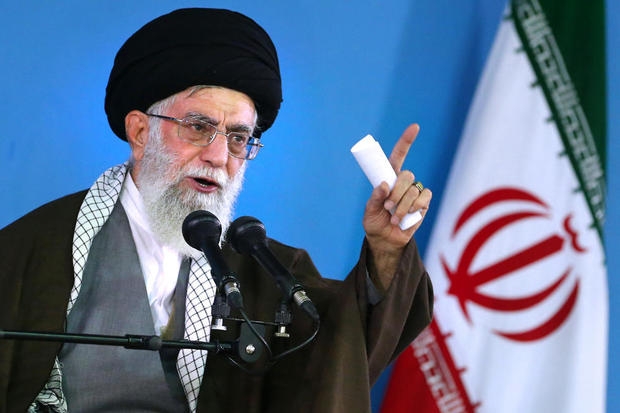Ayatollah Khamenei’s miscalculation may cost Iran dearly

Since the culmination of the nuclear deal between Iran and the world’s six powers, which is commonly referred to by its Farsi acronym as Barjam, the position of Iran’s president, Hassan Rouhani, has been as follows: “[Barjam] removed the malevolent war shadow over Iran … and, [as a result], real security returned to our country.”
According to a report prepared by Raja News, a hardline outlet that quotes several officials on Rouhani’s team, this viewpoint is shared by the president's circle, including his foreign minister, Mohammad Javad Zarif.
However, in his 17 February televised address, Iran’s supreme leader, Ayatollah Ali Khamenei, said in an angry tone, “It is said that in the absence of Barjam, Iran would have become engulfed in war. This is a pure lie.”
What is behind Ayatollah’s position? The arguments presented by the radical camp, including Raja News, could prove telling.
'Which insane? Which war?'
An article published on the Raja News website and widely shared by other hardline news outlets, titled “Which insane? Which war?” read: “The [reformist] chain newspapers and servants of the current that promotes Westernisation, in their headlines and writings, aim to convince people that [Donald] Trump is an insane warmonger.”
Why? “Because,” the article continues, “once people are convinced that Trump is an unpredictable and crazy personality who can take any action [at his choosing], they would be forced to elect a president whose stated policy is centered on ‘patience and toleration’ and believes in detente with Trump, [rather than resistance against him].”
In other words, the moderates’ argument that should Barjam collapse, a war with the US under Trump would be inevitable, is a lie. It is a conspiracy. It is nothing but a propaganda tool designed to scare people in order to distance them from the hardliners, who believe in resistance against, rather than diplomacy with, Washington.
According to Raja News, the ultimate motive behind taking such a position is to attract votes for Rouhani in order to win the upcoming presidential election in May.
'Either war or peace'
In support of Ayatollah Khamenei’s remarks against the president and his team, the most important position was taken by Iran’s powerful Islamic Revolutionary Guard Corps (IRGC) in an editorial in the 20 February issue of the weekly Sobhe Sadiq. The article in the publication of IRGC’s political body was titled, “The invalidity of the argument of either war or peace.”
'One can argue that this dirty scenario of either war or peace, which is pursued for election purposes, serves Zionists, the House of Saud, and the newcomers in the US'
- Islamic Revolutionary Guard Corps editorial
The opening of the editorial maintains that the Rouhani administration “has taken Trump’s aggressiveness as an opportunity … to portray him as an illogical and dangerous person … in order to create a discourse of ‘either war or peace,’ which can have a political application aimed at [shaping the outcome of the upcoming] election in favour of the current administration".
The editorial argues that moderates seek to portray any resistance from their opponents – meaning the IRGC and conservatives as a whole – against the US as dangerous and a symbol of warmongering. Moderates, thus, seek to shape public opinion so that those who supported talks with the US and successfully concluded the nuclear deal represent peace and security for the nation, the article argues.
It then fiercely attacks the discourse of “either war or peace” and positions this thesis as in line with the policies of the Zionists and Saudis, who seek to use Trump-phobia to scare Iran and tame its revolutionary nature.
“Therefore, one can argue that this dirty scenario of either war or peace, which is pursued for election purposes, serves Zionists, the House of Saud, and the newcomers in the US,” the editorial reads.
The article presented six reasons as to why the US is incapable of engaging in a war with Iran. The reasons were briefly as follows:
- High financial costs.
- A lack of consensus both within the US and between the US and its allies on entering into a war with Iran.
- Unpredictable consequences of such a war.
- Trump’s priorities, which are to fix domestic, rather than international, problems.
- Trump’s stated policy of avoiding securitising other nations (namely, Saudi Arabia, the Persian Gulf Sheikhdoms, and Israel) at the expense of the US.
- Trump’s business-focused mindset, which does not favour military confrontations.
The editorial concludes by emphasising that the moderates’ war-or-peace discourse is “in complete contrast with Iran’s national interests".
Trump, watch your step
There are two explanations for Ayatollah Khamenei’s position, which calls such discourse “a pure lie".
The first is that he does not want to allow moderates, as argued by the IRGC, to continue using the argument as a major element of their platform for the upcoming presidential elections. Simply put, he wants to silence and disarm Rouhani and his supporters who deploy this rationale to marginalise the Ayatollah’s own supporters - the radicals and their candidate(s) in the May election.
The second explanation is that Khamenei does not want to give the impression to the new US administration that Iran is in a weak position and will bend no matter how aggressive Washington acts.
In other words, Khamenei seeks to convey the following message: “Watch what you do. If you impose new sanctions or avoid renewing sanctions waivers, as you are committed to under Barjam, we will walk away from the agreement despite your sabre-rattling. We are not afraid of the consequences of taking such a step because we know that you are not in a position to start a war.”
Dangerous misperception?
Iran, in clear defiance of Trump, conducted a ballistic missile test several days after his inauguration. This and additional missile tests in the future will be carried out based on the assumption that even if Barjam collapses, no war will occur under Trump’s watch.
If the US imposes new sanctions under non-nuclear pretexts on the banking and energy sector of Iran, which is quite likely, the nuclear deal will collapse
Such a view is a misperception. It is true that Trump, as an isolationist, does not seek a new war, and that he prioritises domestic issues. However, if the US imposes new sanctions under non-nuclear pretexts – for example, over the expansion of missile programme – on the banking and energy sector of Iran, which is quite likely, Barjam will collapse.
That will result in Iranian retaliatory policies, namely an unstoppable expansion of its nuclear and missile programmes, which could unwittingly drag the two states into war.
Ayatollah Khamenei’s assertion - that it is a pure lie to claim that in the absence of a nuclear deal, war would be inevitable - is a miscalculation.
As the prominent international relations scholar Robert Jervis has put it, “War is most likely if you overestimate others’ hostility but underestimate their capabilities. War can occur without misperception, but rarely.”
- Shahir Shahidsaless is an Iranian-Canadian political analyst and freelance journalist writing about Iranian domestic and foreign affairs, the Middle East and US foreign policy in the region. He is the co-author of Iran and the United States: An Insider’s View on the Failed Past and the Road to Peace. He is a contributor to several websites with focus on the Middle East as well as the Huffington Post. He also regularly writes for BBC Persian. You can reach him at [email protected] or follow him on Twitter @SShahisaless.
The views expressed in this article belong to the author and do not necessarily reflect the editorial policy of Middle East Eye.
Photo: Iran's supreme leader Ayatollah Ali Khamenei addresses teachers during the Teachers' Day on 6 May 2015 in Tehran (AFP)
Stay informed with MEE's newsletters
Sign up to get the latest alerts, insights and analysis, starting with Turkey Unpacked
Middle East Eye delivers independent and unrivalled coverage and analysis of the Middle East, North Africa and beyond. To learn more about republishing this content and the associated fees, please fill out this form. More about MEE can be found here.






